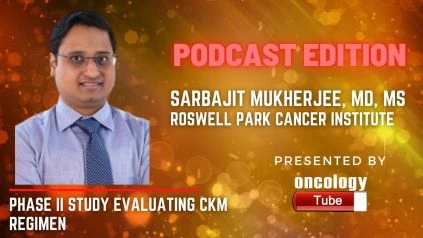Sarbajit Mukherjee, MD, MS, Assistant Professor, Gastrointestinal Medical Oncologist at Roswell Park Cancer Institute. In this video, he speaks about the AACR 2022 Abstract – CT105 / 2 – Initial results of a phase II study evaluating a chemokine-modulatory (CKM) regimen in patients with colorectal cancer metastatic to the liver.
Â
Abstract
Â
Origins:
Â
Liver metastases occur in 20-50 percent of colorectal cancer (CRC) patients, are resistant to immune checkpoint inhibitors (ICIs), and have a poor prognosis. Our preliminary findings demonstrated a synergistic effect of IFN and TLR3 ligands in selectively increasing the intratumoral production of CD8+ T cell (CTL) attracting chemokines (but not Treg attractants) in ex vivo-treated CRC explants, as well as a preferential impact of this combination on liver-metastatic CRC tumor tissues (rather than surrounding liver tissues). Based on these findings and previous research demonstrating the prognostic value of intratumoral CTLs in CRC outcomes, we hypothesized that systemic infusion of IFN2b combined with rintatolimod (selective TLR3 ligand for intravenous use) could reprogram the local balance of CTL- and Treg-attracting chemokines and the resulting patterns of immune infiltrate in liver lesions.
Â
Methodologies:
Â
Patients with recurrent/metastatic CRC who had unresectable liver metastases amenable to biopsy were eligible. Patients had received prior treatment (Rx) with fluoropyrimidine, irinotecan, oxaliplatin, and anti-EGFR targeted therapy (if RAS wt), or were contraindicated to such treatment. On days 1, 2, 3, 8, 9, 10, 15, 16, and 17, patients received IFN2b IV (20 million units/m2 IV daily) and rintatolimod (200 mg IV daily), as well as oral celecoxib (200 mg twice daily). On D46, liver samples (pre-Rx and on day 24 4 days) and CT imaging (RECIST v1.1) were used to measure response. The primary outcome was the difference in CD8+ T-cells between before and after Rx (as evaluated by quantitative RT-PCR as a ratio of CD8 to a housekeeping gene, HPRT). The study design has 90 percent power to detect a 0.77 standard deviation increase (pre- to post Rx) at a significance level of 0.1 with a sample size of N=12 evaluable points (ClinicalTrials.gov Identifier: NCT03403634).
Â
Outcomes:
Â
Between April 2018 and October 2020, 19 patients with microsatellite stable (MSS) CRC were enrolled; 15 were treated, and 12 were evaluable for the primary objective. The majority were men (75 percent, N=9) and Caucasians (92 percent, N=11). At the time of diagnosis, the median age was 65 years. The majority (58 percent, N=7) had previously undergone three or more lines of therapy. The primary aim of the trial was met, as shown by enhanced CD8a expression after therapy (p=0.046). CD8a/CD4 (p=0.03), CD8a/FOXP3 (p0.01), and GZMB/FOXP3 (p0.01) ratios all increased. CTL-attracting chemokines CCL5 (p=0.08), CXCL9 (p=0.05), and CXCL10 (p=0.06) were upregulated, while the Treg/MDSC attractant CXCL12 (p=0.07) was downregulated. The median OS was 10.5 months (90 percent CI 2.2-15.2), and the median PFS was 1.5 months (90 percent CI 1.4, 1.8). There was no objective response. The procedure was well tolerated. Adverse events were reported in 74% of all recruited patients (N=19), with weariness being the most common (58 percent ). Adverse events of grade 3 or above were uncommon (5 percent ). Age, gender, treatment line, RAS mutational status, and tumor location had no effect on CD8a change or PFS.
Â
Summary of findings:
Â
Our findings suggest that a combinatorial CKM regimen can re-program the immunosuppressive tumor microenvironment in MSS CRC patients with liver metastases, suggesting the prospect that the CKM regimen can be employed to improve the efficacy of ICIs in this patient population.

